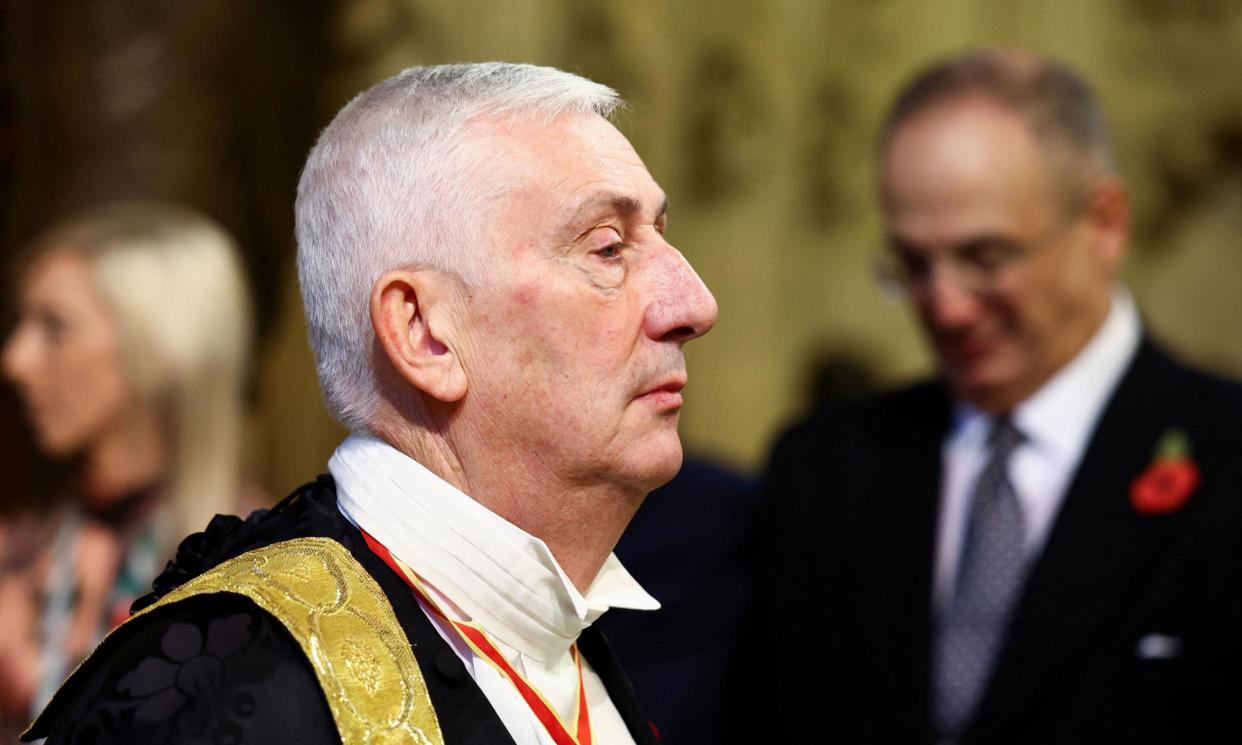Speaker accused of breaking promise as he rejects call for new Gaza vote

The Commons speaker, Sir Lindsay Hoyle, has rejected an SNP request for a further Gaza ceasefire vote after last week’s angry scenes at Westminster amid concerns that it could be a further breach of parliamentary protocol.
The SNP had asked for a vote on a “substantive” motion on whether there should be an immediate ceasefire after the speaker said last week that he would be willing to consider an emergency debate.
However, the Foreign Office minister Andrew Mitchell is understood to be making a Commons statement on the Gaza conflict on Tuesday which, under parliamentary protocol, would be prioritised over the SNP request.
Hoyle’s decision brought a number of new signatures to a motion expressing no confidence in the speaker, with 80 MPs now backing the call for him to step down, and accusations that he had “broken his word” over promises of another debate on Gaza.
SNP insiders had argued there was a precedent for an emergency debate to conclude with a vote on a substantive motion, which would give MPs the chance to explicitly call on the government to actively pursue an end to the Israel-Gaza conflict.
The former speaker John Bercow allowed more than a dozen such debates during the passage of Brexit through parliament, although the move prompted fury among some Tory MPs who argued that it was a breach of protocol.
The motion put forward by the SNP was not neutral, instead saying that Israel is engaged in “collective punishment” against the Palestinians and urging ministers to end arms contracts with the Israelis and take other “tangible” measures, including votes on the UN security council, to achieve an immediate ceasefire.
Hoyle told MPs that he had been advised by Commons clerks that emergency debates should be “neutral”, meaning MPs just “take note” of an issue. He had the support of all four of his deputy speakers.
“In determining whether a matter is urgent, I must have regard to the probability of the matter being brought before the house in time by other means. The house came to a resolution on this matter on Wednesday last week,” he said.
“Further, I understand the government is ready to make a relevant statement tomorrow so there is a very imminent opportunity for this important matter to come before the house.”
Last Wednesday he was left fighting for his political career after he broke with precedent – against the advice of his officials – to allow a vote on a Labour amendment to the SNP’s motion on Gaza amid concerns over MPs’ safety.
The next day he apologised and offered an emergency debate, saying: “I regret it. I apologise to the SNP … I apologise and I apologise to the house. I made a mistake. We do make mistakes. I own up to mine.”
Stephen Flynn, the SNP’s leader at Westminster, said Hoyle’s decision to reject a further vote called into question the trust placed in him.
“Last week the speaker of the House of Commons broke the rules, this week he has broken his word,” he said. “I would imagine that parliamentarians across the chamber will be deeply concerned about the fact that the speaker of the House of Commons has made a clear and unambiguous statement, stating that he would have a debate and a vote in relation to the situation in Gaza, and that he has instead opted not to do that.”
Momentum to oust Hoyle appears to have slowed since his apology, with only four MPs adding their names on Friday and a further nine signing it after Flynn’s intervention on Monday.
There was no indication from the government that it would be willing to allow a confidence vote, while several senior Tories have come out in his defence. After his announcement in the Commons, some Tory MPs offered the speaker words of support and pats on the shoulder as they left the chamber.
Hoyle had argued last week that allowing a vote on Labour’s amendment meant MPs could express their views on the “widest range of propositions”, helping to protect them from threats to their safety amid heightened scrutiny over their stance on the conflict.
However, the decision meant Labour avoided a potentially damaging rebellion over whether it supported the SNP’s ceasefire call, which went further than Labour’s by calling for an end to the “collective punishment of the Palestinian people”.
This led to accusations – denied by the party and the speaker – that Labour had put pressure on him over the decision.


